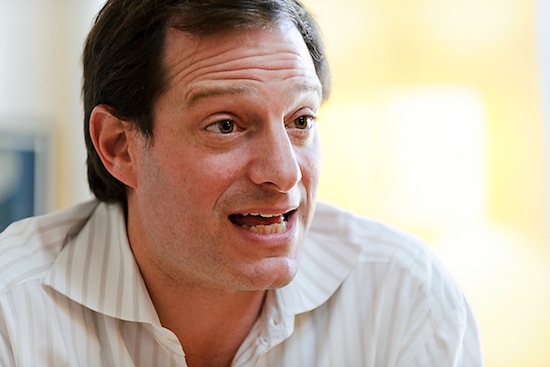Political scientist helps government officials understand, prevent genocide

Scott Straus is working with federal officials to help them understand the causes of genocide and identify ways to prevent atrocities.
Photo: Jeff Miller
The unthinkable is Scott Straus’ stock-in-trade.
The barbarity and righteous conceit that spawns genocide is his research focus, and Straus, a political science professor at the University of Wisconsin–Madison, is using his expertise to help agencies throughout the U.S. government better understand the causes of genocide and ways to prevent atrocity around the globe.
“It was an honor and challenge for me to translate some of the research findings that I’ve developed into concrete, learnable lessons for officials who have to wrestle, in real time, with how to identify and respond to these terrible events,” says Straus.
President Obama signed a directive last spring stating that preventing genocide and mass atrocities is a core moral and national security responsibility, and establishing a board to find new strategies and tools to prevent atrocity.
The directive called for widespread training on the issue, and Straus was enlisted to design and organize a daylong workshop at the U.S. Holocaust Memorial Museum in Washington, D.C. in late October that trained 75 officials from the Department of Defense, CIA, FBI, Department of Justice, Department of Homeland Security, Department of State and other agencies about how to identify and stem genocide.
“You need political will to have a better policy response to these terrible events. And this initiative is a translation of that political will. It’s saying that genocide and mass atrocity prevention are a priority for the United States and we want to do better on this front.”
Scott Straus
“They sent representatives to learn the field, and they will tailor programs to help their own agencies,” says Straus, who brought together some of the leading academic experts in the field to teach the workshop. “We focused on definitions, causes, patterns of the run-up to genocide, and how you know it when you see it and how to respond.
“Those are hard questions — harder than what you would think,” adds Straus, who welcomes the chance to use research to inform policymakers in practical ways.
In the coming months, Straus plans to work with government agencies that are building their own training programs, providing assistance with curricula and educational content.
Straus’ interest in the causes and effects of genocide took root when he witnessed the bloody fallout from the Rwandan genocide in 1994. As a freelance journalist based in Nairobi, Kenya, the 26-year-old Straus was covering a war in the Democratic Republic of Congo in April 1996 when he and others came upon a mass grave containing the bodies of women and children, many of whom had been slain with machetes.
“I had seen people killed in combat, but I’d never seen a pile of dead bodies of civilians,” says Straus. “Having brushed up against the legacies of mass violence, I was compelled to want to try and understand why it happens. That has led to a career in trying to understand why genocide happens.”
Straus has authored several books on Rwanda, including “The Order of Genocide: Race, Power and War in Rwanda,” “Remaking Rwanda: State Building and Human Rights after Mass Violence,” and “Intimate Enemy.”
He says it is sometimes difficult to know quickly whether genocide is under way, since many atrocities are connected to an ongoing war. But key indicators include whether large numbers of civilians are being targeted, evidence that they are being targeted for groups they belong to, the repetition of the violence and at multiple locations, and the displacement of large numbers of refugees.
There are also indicators that can predict a run-up to genocide, Straus says. The risk of genocide and mass atrocity, he says, is greater when there is armed conflict, a history of discrimination, a weak national government and widespread poverty.
“At the workshop, we had to be honest about what we think we know and what we don’t know,” Straus says. “We also had to be honest about the fact that government involvement can be really positive and can also carry negative effects. Prevention can mean the use of force. There are new risks involved with that.”
Gretchen Skidmore, director of civic and defense initiatives at the U.S. Holocaust Memorial Museum and one of Straus’ colleagues in the effort, says his work gave government officials an important window into the issues.
“I was really impressed with how Scott had an ability to translate complex ideas into concepts that can be applied to critical policy and training decisions that are being made right now across the government,” she says. “He is a uniquely talented scholar in being able to think about how to apply the research to the current and critical work of the leaders in the government.”
Straus says the government effort to identify, prevent and respond to mass violence is a positive step.
“You need political will to have a better policy response to these terrible events. And this initiative is a translation of that political will,” he says. “It’s saying that genocide and mass atrocity prevention are a priority for the United States and we want to do better on this front.”



